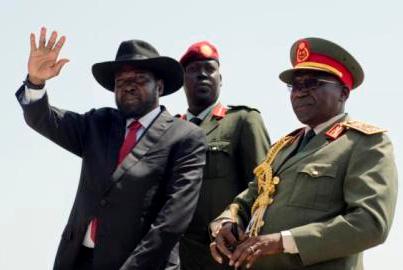Ex-S. Sudan army chief was a threat to President Kiir: aide
September 27, 2017 (JUBA) – General Paul Malong Awan, the former South Sudanese army chief who was sacked in May, had proved to be a threat to President Salva Kiir, a close aide revealed.

Further added the source, “He [the former army chief] was a clear threat to presidency and the life of the president was at stake”.
Awan, an ex-governor, was replaced by the army’s deputy chief of general staff for administration and finance, Lt. General James Ajonga Mawut.
By the time of his removal, Awan was overseeing an army that was in the spotlight, amid accusations of gross human rights violations, rape, atrocities and war crimes on civilians in conflict-affected areas.
The former army chief, who had recruited a notorious militia from his home region, allegedly failed to crack down on abuses by soldiers.
Meanwhile, a prominent Jieng (Dinka) Council of Elders (JCE) member separately told Sudan Tribune that the ex-army chief at one point allegedly threatened to arrest Kiir over succession plans sidestepping him in favour of another person.
“I knew relations between President Salva and Gen. Paul Malong would not last. And I knew the two things would occur. And one of these things was that if president decides to remove Malong without assigning him to another position, Malong would not accept and he and his supporters would cause a situation that would put the country at stake,” the JCE member, who preferred anonymity, said.
He added, “Malong himself told us categorically that he did not want to remove president, but he would not accept the president to sidestep him and appoint a successor other than him [Awan]”.
According to the JCE member, Kiir and his allies, mainly from the greater Warrap state did not want Awan to assume the presidency.
“Gen. Malong felt he was being exploited and betrayed, despite all he has done. You could see bitterness and deteriorating relations each there is a meeting between President Kiir and Malong”, he further explained, adding, “When the decree was issued, it did not surprise me. I knew it was one of the scenarios that would happen given the relations that were in existence and evolving situation”.
On Sunday, the former army chief of general staff said he does not have any problems with President Kiir, attributing his sacking and current detention to the pressure being exerted on the South Sudanese leader.
“There is no personal problem between me and president Salva. What happened [was] he [Kiir] was under pressure and so he implemented what others wanted”, he told Sudan Tribune.
The former army chief, who was axed in May, claimed president Kiir was being pushed to treat him in a manner likely to cause reactions.
“They know our relations and so they are not happy and they have been trying all along to cause this situation. I told the president several times about the activities of these people and he told me he was aware. So there was a pressure which we all know”, said Awan.
Awan also vowed never to fight the very government he worked to maintain. He specifically cited the vital role he played in 2004 when late John Garang de Mabior, the founding leader of the Sudan People’s Liberation Movement (SPLM) fell out with Kiir, who was then his immediate deputy.
The ex-army chief was one of the three officials sanctioned by the United States administration for undermining peace, security and stability in the war-torn country.
The sanctions, the U.S. Treasury Undersecretary for Terrorism and Financial Intelligence, Sigal Mandelker said, implied freezing assets they may have in U.S. jurisdictions, banning them from travelling to the U.S and preventing Americans from doing business with them.
The nearly four-year conflict in South Sudan had killed tens of thousands of people and driven more than 2 million children out of the country, the United Nations says.
(ST)
